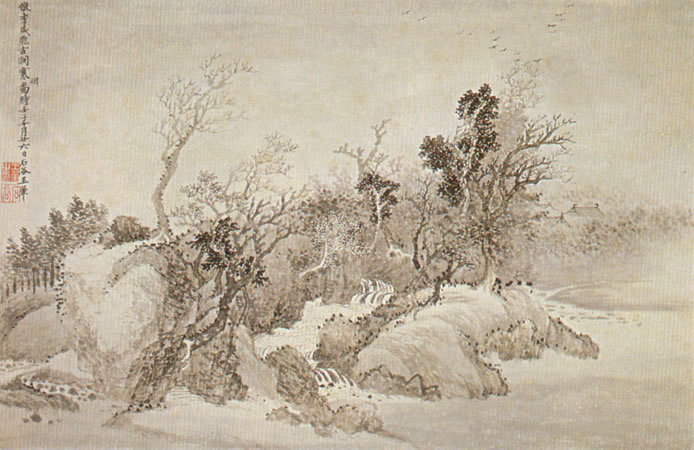The title of the blog, Apologia pro Literati Vita, has two sources. One is Cardinal Newman's memoirs, Apologia pro Vita Sua; I merely subtracted the pronoun and added the genitive form of literatus, the word generally used to describe the Chinese gentry scholar. Cultivating the virtues and arts of the literatus, the rediscovery of leisure, and the role, attitude and responsibility of the gentlemen towards his cultural patrimony are precepts inspired by my reading in Chinese philosophy, though the essential elements are no less present in the ancient Western philosophers.
The Chinese literatus was trained from childhood in the Chinese classics, the Confucian Analects, Mencius, The Doctrine of the Mean, the Taoist scriptures, particularly the Tao Te Ching and the works of Chuang Tzu, and the more catholic-minded, studied the Ch'an Buddhist scriptures. But above all, it was the works of Confucius and his followers that pre-occupied the minds of Song, Ming, and Q'ing literati. Men, young and old, read and re-read the Confucian classics in the hopes of obtaining the coveted jinshi degree. It was not uncommon for men in middle-age to devote their time and energy to obtaining the degree, perhaps studying with young sons or kinsmen who, half their age, also hoped to pass the Imperial exams.
If the Chinese literatus passed the exam, he could hope for a governmental job that would provide a lucrative income for his family. And when the literatus had successfully secured himself and his family an income and property and after he discharged his duties, he devoted himself to the art of leisure.
“Happiness is thought to depend on leisure, for we are busy so that we may have leisure, as we make war so that we may have peace," writes Aristotle in his Nichomachean Ethics. Leisure is the prerequisite for philosophy: the search for wisdom requires freedom, a freedom that can only come when one's own basic needs, for shelter or food, are satisfied.
The Chinese literatus, by virtue of his governmental provision, enjoyed a life of comfort and ease: his material wants were amply provided for and he enjoyed the respect of his colleagues and inferiors. He maintained this respect by a constant cultivation of the scholarly arts. He discharged his own official duties; he continued his study of the philosophical and religious classics of ancient China; he provided for his own sons' educations, and he practiced the Four Arts:
I hope in the future to enlarge on the theme of 'leisure', what I mean by the word, and its role in the most important cultural developments: philosophy, art, religion, literature. What's important about the Chinese literati tradition is the presence of a canon of philosophy and of artistic technique. Contrary to the Modernist sturm und drang, tradition does not mean cliches and kitsch. One need only study the history of Chinese landscape painting to see the work of millenia being distilled to a purer and higher degree, through a conscious use and adaptation of traditional techniques and through individual innovation. At present, there is no class in contemporary society trained in a widely accepted canon of philosophy or artistic technique. T.S. Eliot, in his classic Christianity and Culture, writes:
"You cannot expect continuity and coherence in literature and the arts, unless you have a certain uniformity of culture, expressed in education by a settled, though not rigid agreement as to what everyone should know to some degree, and a positive distinction--however undemocratic it may sound--between the educated and the uneducated. I observed in America, that with a very high level of intelligence among undergraduates, progress was impeded by the fact that one could never assume that any two, unless they had been at the same school ... had studied the same subjects or read the same books, though the number of subjects in which they had been instructed was surprising ... In a negative liberal society you have no agreement as to there being any body of knowledge which any educated person should have acquired at any particular stage: the idea of wisdom disappears, and you get sporadic and unrelated experimentation."Would that we had a class of individuals, educated to an exemplary degree, trained in music and the arts, philosophical in outlook. It seems impossible to imagine a happy future without some such class coming into its own. What will the modern American literatus look and what will his Four Arts be?
















